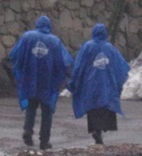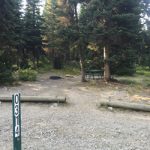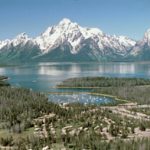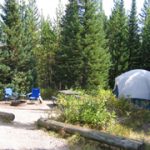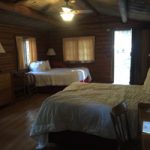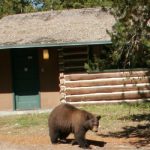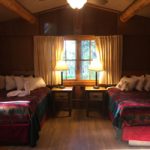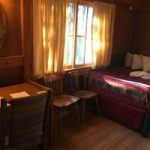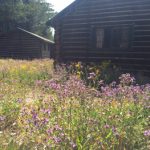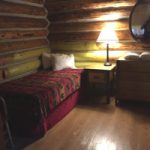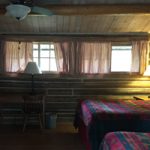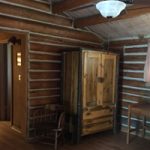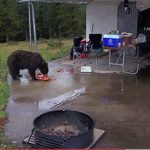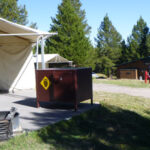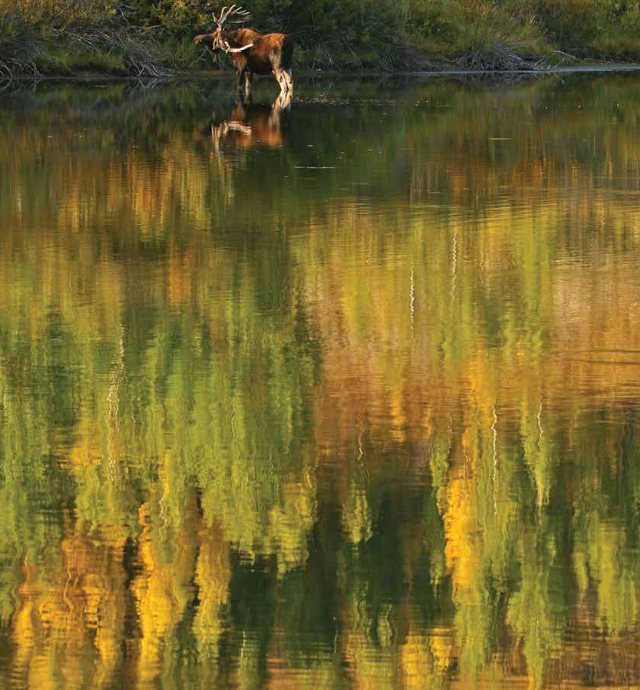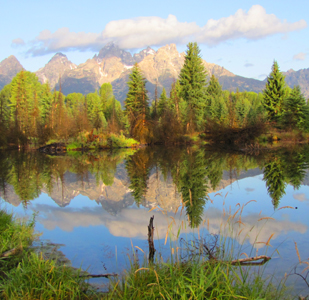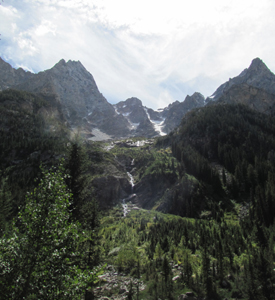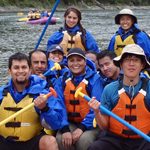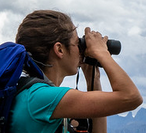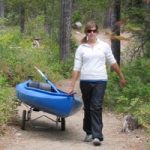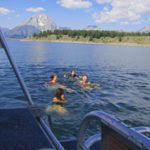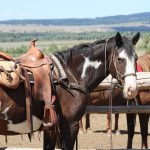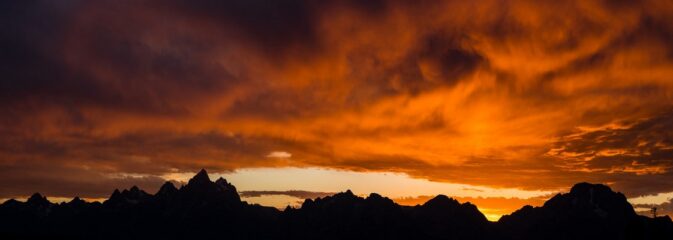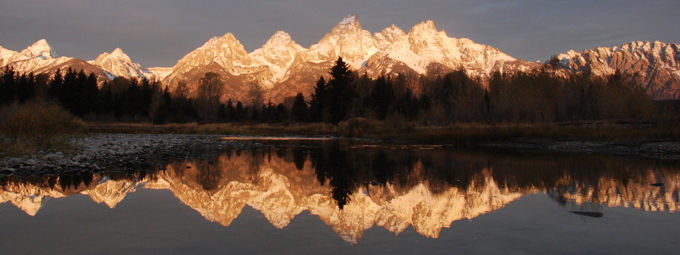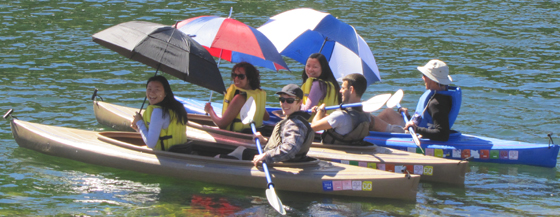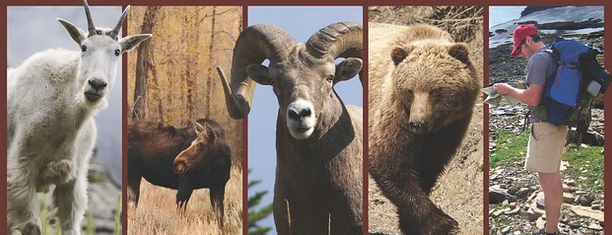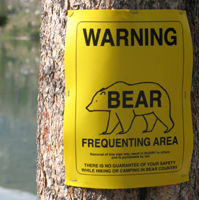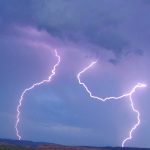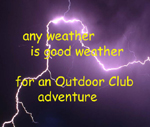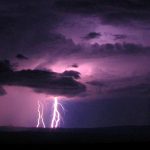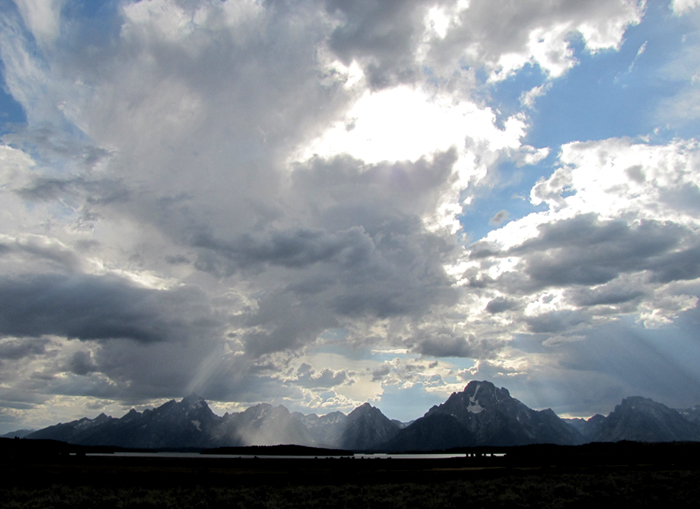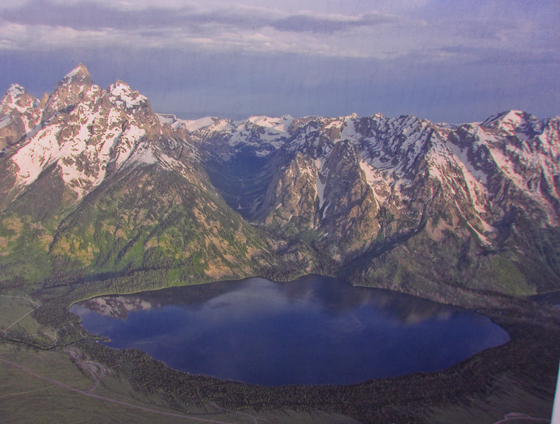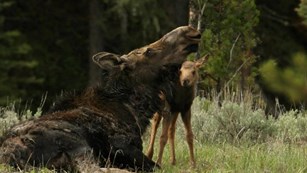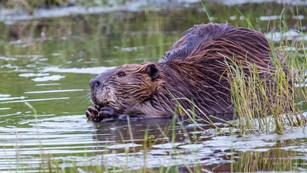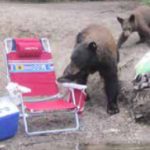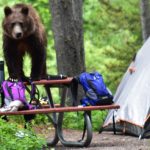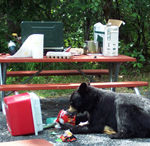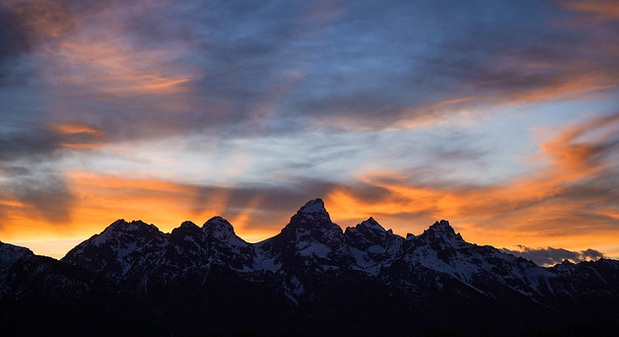
The Outdoor Club is doing another adventure in Grand Teton National Park
any or all days, August 12 – 30 2026 +/- (between summer and fall quarter).
We will update this page closer to the next adventure.
Participants can stay for their choice of a shorter, longer or much longer trip; for a long weekend or many weeks. Details about cost, activities, overnight accommodations and more are at: Grand Teton National park trip
After you have carefully read this page,
if you are fairly sure (or completely sure) you are going on the between-summer-and-fall-quarter, August 2026 trip to Grand Teton National Park
please email the club advisor at donahuemary@fhda.edu to get on the trip email list.
Include how sure you are that you are going,
what days do you want to go on the trip. (You could answer this by saying that any or all days between Aug. 13 and Aug. 31 are okay for you, or some other range of dates. Or you could tell me specific dates.)
how you will get to Wyoming,
and where you will stay overnight, (camp or cabin or some other location you have reservations for)
or just let me know that you are not sure yet about travel arrangements,
or that you need a ride/someone to share the cost of a cabin with, etc.

This page is sometimes updated close to the start of each trip,
but we can expect most of it to stay the same.
To sign up for the trip you will need to show us your waterproof rain pants and hooded rain jacket.
We will not accept rain ponchos, as they do not keep you fully dry.
We will not accept thin, easily torn temporary rain gear like they sell at airports for emergencies.
The club advisor no longer wants to create rain gear from huge plastic bags for people to wear as the woman on the right in this photo is modeling:
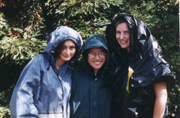
We would also like to see your tent, to be sure it will be adequate. You can pitch it when you sign up.
Read more details about the right gear at snow or rain camp must-haves
To sign up you will need to pass a “test” to show that you actually DID read the material about the trip, so reading this page twice and following through to other webpages linked to could be wise.
Many people get perfect scores on the test.
After you have done the reading and contacted/emailed the club advisor at donahuemary@fhda.edu,
and have decided on the logistics of your trip,
To sign up for this trip,
go to How To Sign Up which will be updated closer to when we start signups.
______________________________
Paying for the trip is not as easy as before, because De Anza Student Accounts has not always had an office on campus open for people to go in and pay with a credit card or cash. We have not accepted personal checks for years, because the club has had to pay tooooo many check bouncing fees, so we are requiring you bring a money order when you come to sign up. Everyone will need to get a money order for their trip payment from the Post Office, a Walmart or your bank (if your bank is low cost for you) and bring it when you come to sign up.
(THIS WILL BE UPDATED CLOSER TO THE 2026 TRIP)
Students got five campsites to share for the 2026 trip. They reserved two campsites for August 14 to 28, one campsite for August 15 – 29 and two campsites for August 16-29 and the people who got extra campsite reservations to share need to cancel any that are not needed in time to get deposits refunded. (If you want to camp in one of these, make arrangements when you sign up for the trip.) Plus there are chores to do before we go, including a cleaning of each kayak and canoe we bring so they can pass the required inspections in Idaho on the way to the park and in Grand Teton park before they can be permitted and used there. Because of this, there is a deadline to sign up. See details at the how to sign up page to be updated closer to the trip.
The cheap trip,
The not-so cheap trip
The slightly more costly trip, but less driving time also known as the I-can’t-get-much-time-off-work trip
and The Expensive Trip
details are at trip cost.

The club advisor does not have the time to answer questions about the trip that you could have found the answers to by reading ALL the webpages linked to from this webpage and from the main trip page thoroughly and carefully.
This is a sample of the trip agreement you will fill out and initial/sign when you sign up in person (there are no online signups for Outdoor Club events) for the August 2026 trip to Grand Teton National park, Wyoming.
Please read it carefully so signing up will go faster.
If you are under 18 years old, your parent/guardian must sign documents in person. The College has a rule: “Minor Students/Participants may not take part in overnight events without parental supervision.” Therefore a parent/ guardian must become a student and sign up for the trip, be at the overnight accommodation(s) and fully participate alongside the minor student in all activities s/he decides to participate in, including all activities that are not official club activities that trip members decide to do on their own time.
You must agree to all these rules.
If you want to depend on cheap rain gear (a poncho, for example, instead of a waterproof hooded rain jacket and rain pants), then don’t sign up for this trip.
If you don’t want to abide by any of the rules: you don’t want to stay close in with the group while out kayaking, you want to go near or tease or feed animals, etc.
then (yup, you guessed it) don’t sign up for this trip.
The answer to the question: Why are there so many rules? is here.
Along with this trip agreement you will need to sign another college release.
You should read it in advance at field trip release
Please don’t print this webpage and fill it out,
it is only a sample and it might have changed right before you sign up for the trip.
Also please read trip cost details.
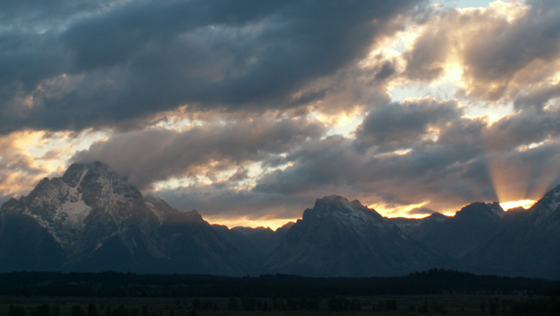
– – – – – – – – – – – – – – – – – – – – – – – – – – – – – – – – – – –
Outdoor Club Grand Teton Nat’l Park Kayaking Trip Agreement
(all days or any days), August 12 – 30 2026
Print name_______________(the name used on college records, not a nickname you prefer)
Phone no.______________ Cell_______________ Age______
Email_________________ Emergency person___________________Their phone_________________
emerg persn’s relationship to you (mom? friend?) _________________________
Health Insurance: (circle) NONE or Don’t know or company name:______________ policy#_____________
Circle as needed, initial next to policy statements/ safety rules to agree to them. If a minor is signing up for this event, their parent/guardians must sign this trip agreement in person, and the minor should also initial all parts of the document alongside their parent/guardians’ initials.
Use your initials (don’t put an “X”).
The event begins and ends in Grand Teton National Park. De Anza/Foothill district, and therefore the club, does not arrange carpools, so people signed up for the trip will arrange their own transportation to and from the park and pay for their own gas and park entrance fees. All transportation during the trip is also your responsibility, not the club/college’s, whether to official kayaking/hiking destinations or sightseeing/hiking/restaurant excursions, etc. that some or all of the group does together either intentionally or by coincidence, with or without the club advisor. ______
Overnight accommodations will be your choice, but the students usually share campsites/cabins. You agree you will not share any overnight accommodation with anyone not actually signed up for the trip. Initial here: __________
I acknowledge that De Anza College has a rule: “Minor Students/Participants may not take part in overnight events without parental supervision.” Therefor a parent/ guardian must become a student and sign up for the trip, be at the overnight accommodation(s) and fully participate alongside the minor student in all activities s/he decides to participate in, including all activities that are not official club activities. ______ If it is discovered that a minor is on the trip without a parent / guardian with them, they will be dismissed from the trip with no refund and reported to the college for possible disciplinary action. Initial here to agree _________
Everyone who goes on a (optional and not a club event) wilderness overnight / backpack needs to plan to keep their regular overnight accommodation (campsite, cabin) for that night, even though they will not be there. If you have to cancel (weather is moving in and we will be having lightning and it would be dangerous to hike to a high elevation), then everyone will need to go back to their overnight accommodation. Trying to move out of a campsite or cabin the morning of an overnight, and somehow cramming people’s extra gear and their food from their bear box into another cabin would take too long. Yes, it would save money to not pay for your cabin or campsite for that night, but it could wreck the trip, so everyone must agree to not move out of their overnight accommodations during any overnight they get a reservation for. Initial here to acknowledge this: ______
I will check my emails every day until the trip______
I will understand all the trip rules well enough before I sign up that I will not debate them during the trip Initial______
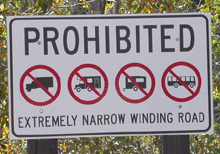
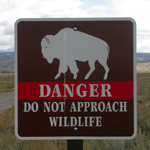
If you can give a ride, or need a ride, do you give the club permission to give your phone number & / or e-mail to anyone associated with the trip? circle yes / no
(Possibilities for public transit, driving routes advice and logistics of flying are at: trip transportation)
I will use PUBLIC TRANSIT the entire way, and will arrange a ride from the airport, train or bus station to Colter Bay.
Circle all you will use: BUS, TRAIN, FLY.
FLY (circle 1,2,3 or 4 below)
1) I will fly as far as Salt Lake City, Utah and then rent a car and drive the last six hours
2) I will fly as far as Salt Lake and then take a (circle one) train / bus to Jackson and arrange for a ride into Colter Bay.
3) I will fly into Jackson, Wyoming and (circle) rent a car / arrange for a ride into Colter Bay
4) other plans, describe: If you know the dates/times/airline list them here:
Choose one
I will use public transportation and rent a car and I can give rides ____
I will use public transportation and rent a car but I have my own plans and my own passengers
I will use public transportation and arrange a ride to Colter Bay or to (describe) _____________
I will use public transportation and have a ride with_________________ to Colter Bay or to ____________________
DRIVE
1) I will drive/ride the whole distance, straight to and from the Bay Area, with only minor extra stops
2) I will drive/ride there as a part of a longer route. Describe your route:
Choose one I know I can’t drive and I have no ride planned, but I need a ride
I won’t drive, but I have a ride planned (with who?____________________________)
I will drive and I can give rides (Number of people you could give rides to, with lots of room for gear. ______ )
I will drive, and already have passengers (who?) ______________
I will drive, but I will be making my own plans and do not want to give rides
Make, model, color & license # of vehicle you will drive_______________________
Date/time you expect to leave for the trip:________________
date/time you expect to arrive in the park ___________________
and end the trip:_______________________
time you intend to take for the drive ___ straight through 21 +/- hours or: ________________________
I will not ride a motorcycle to / on the trip because I am not safe from lighting while riding a motorcycle.___________
CIRCLE again: My plans above are certain
OR my plans above still need approval from a parent/guardian
OR my plans above still require getting a vehicle in shape
OR my plans above still require renting a vehicle
OR (describe) _________________________________
I will reread the website page Road Trip Advice and Etiquette____
Will you bring a cell phone on the trip ? Y / N , if yes, what is the number?_________________________
What service do you use? ________________
I acknowledge that cell phones do not function in many parts of Grand Teton National Park _____
The club and the College are not responsible in any way for your transportation/carpools on trips, but they expect that everyone will wear seatbelts and obey all traffic laws, drivers will have licenses and sufficient insurance, vehicles will be in good repair. I will not pick up hitch-hikers. I will follow all speed limits, including slowing to 20 mph under the posted speed limit when passing stopped emergency vehicles with flashing lights, slowing to 15 MPH within 100 feet of a park entrance station and slowing to 45 mph at night (30 minutes after sunset to 30 minutes before sunrise) on the main park highway (191 26/89) from Jackson into and through the park. 45 mph max in Yellowstone. When I am driving around sightseeing, I will use pullouts or parking lots to stop. I will not stop in the roadway or block traffic in any way. I will park with all four tires fully to the right of the white line. Remember that parking on natural vegetation results in permanent damage to plants; violators are ticketed. I will not park a vehicle in tall dry grass because hot tailpipes can cause fine fuels to catch on fire. Initial here: _______
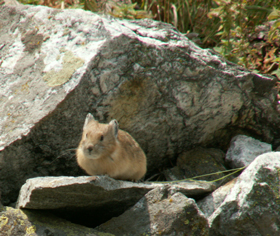
Yes/No I have camped for more than one week at a time.
Yes/No I have camped in snow.
Yes/No I have camped during prolonged rain.
Yes/No I have kayaked more than 2 miles in one day
Yes/No I have backpacked more than 5 miles in one day
Circle which elevation(s) you have experience (C) camping (H) hiking (B) backpacking or (K) kayaking at?
C H B K sea level or near it (Cupertino, for example)
C H B K 4000′ (Yosemite Valley, for example)
C H B K 6000′ (Lake Tahoe, for example)
C H B K 9000′ (Tuolumne Meadows)
C H B 10,000′ or more
I am (c) currently (r) recently within the last two years (f) formerly certified in:
first aid c/ r /f
C.P.R. c /r /f
lifeguard training c / r / f
other:
There is not-too-cold to practically warmish swimming in lakes/streams we might visit and a swimming pool might be available to use.
Do you know how to swim? Yes / No / a little (If no or a little I will stay in shallower than standing depth water which has no current).
I will swim during club event times only when there is a currently certified lifeguard or two formerly certified lifeguards (okayed by the club advisor), nearby actually watching the group _____
I know that even with a lifeguard present I swim at my own risk _____
If I swim during times that are not trip functions, I will only swim in daylight hours with a minimum 4 people, while none are tired, under the influence of alcohol, drugs, or medication_____
I will not dive or jump into any body of water or hotel swimming pool _______
Yellowstone warns: “Swimming or soaking in hot springs or their runoff is prohibited.” Since any injury to a trip member can adversely affect the rest of group or at least their carpool, swimming or soaking or even wading in hot springs, or downstream from hot springs, is banned during this trip. _____
The club might provide food, and in case people want to share food, choose &/or describe:
are you vegan, vegetarian, lacto-ovo (milk, eggs) vegetarian, omnivore?
Do you have any food allergies or foods you will not eat?
(Even though you are telling us about these, you are responsible for making sure you do not ingest anything you are allergic to and if you have an epipen prescription, carrying it with you all the time) initial ______
I know how to use:
T/F a gas stove
T/F a propane stove
T/F a water purifying pump
I know how:
T/F to repair the stove I intend to use
T/F to cook on a camp stove, to at least the level of not destroying my food
T/F to cook over/in a fire without burning everything
T/F to build a campfire that produces very little smoke
T/F to read a topographical map, including orienting it to a compass
T / F I can recognize dry wood for a campfire (as opposed to rotten wood or green wood)
TRIP COST paid to the club will be $175 club members and $185 other students.
$60 of each trip participant’s fee will be pooled and split as a credit towards future events (within one year) among those who help with kayak loading/cleaning as needed before the trip and especially un/re-loading/cleaning after the trip. We will clean and load kayaks onto the trailer on (Sunday, August 2, 2026 10 a.m. or To Be Announced, possibly with little notice) where the kayaks are stored. We will unload kayaks upon return of the trailer and clean them on a day to be determined that might not be convenient for all the trip members, so they might not all get a credit towards a future trip. (Sunday, Sept. 20, 2026 10 a.m. or To Be Announced, possibly with little notice) Initial: ______
The club will provide: a faculty advisor, a first aid kit, and possibly a water purifying pump for club led hikes and kayaking.
If they can be transported, the club will provide: a limited number of drybags, kayaks, paddles, and lifejackets (which must be worn and strapped securely).
If we can transport the De Anza owned kayaks, your trip fee will pay a portion of the kayak permit fees that Grand Teton Park and the State of Wyoming charges, even if you say in advance that you will not kayak at all with us.
If we have a really big group, the first signed up and paid will have priority for boat use, others will/might need to rent.
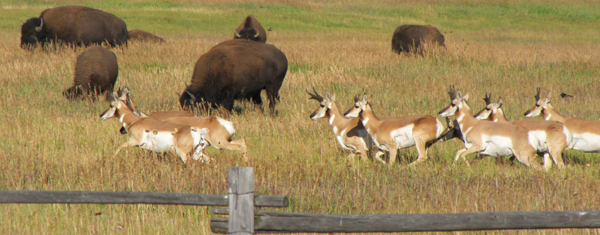
Weather or other problems can cancel or postpone any and all kayaking.
The club offers no refunds unless the entire trip is completely cancelled. ***NO REFUNDS for no shows or partial participation.***
Your trip fee will also pay $15 towards the purchase of bear spray, which is required for everyone to carry. In a dozen years of club trips no one has had to use (spray) any bear spray. We expect that we will need to pay up to $60 per can. Since people will probably not actually use (spray) the bear spray (will only carry it), and might not return to the Rocky Mountains again soon, having each trip member pay for a can of bear spray seems too expensive, the club will buy the cans and charge people one fourth of the cost as a kind of rental (we expect to be able to find spray that does not expire for four years and can be carried again by future trip members). Trip participants will not “test” spray the spray because it can empty in less than ten seconds. It must be returned unused (except in the incredibly rare instance it actually needs to be used on a bear). Bear spray will be returned promptly at the end of the trip or the student will be charged $60 for it. (More later in this contract about bears and bear spray use.)
Initial here to acknowledge all the trip cost terms and details above __________
– – – – – – – – – – – – – – – – – – – – – – – – – – – – – – – – – – – – – – – – – –
You can encounter a bear using the same trail you are hiking:
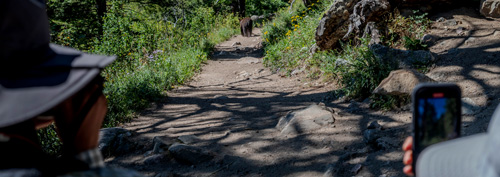
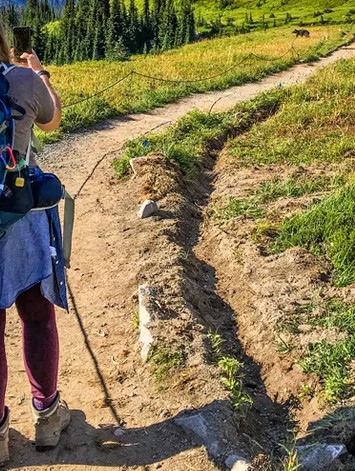
Or an elk: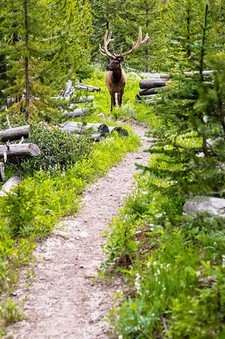
and it is always your job to move (far) away from them and let them pass.
– – – – – – – – – – – – – – – – – – – – – – – – – – – – – – – – – – – – – – – – – –
Trip participants are responsible for all other costs, including, but not limited to: park entrance fees, (see details about this fee at the trip cost webpage) food, campsite or hotel cost, gas and other transportation costs, equipment rental, purchase of required waterproof outer layers in case of rain or snow, and other personal clothing/gear, laundromat/shower/swimming pool fees. Initial here to agree to the above terms: _________
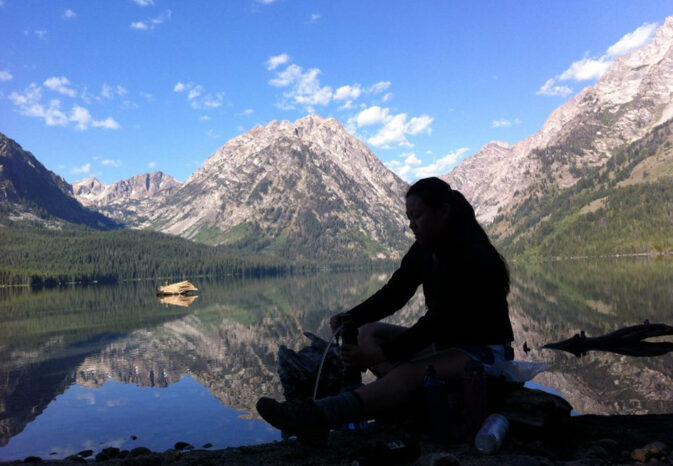
If I camp I will bring at least one (but two are advised) full length insulating sleeping pad and not just sleep on an air mattress, a blanket or the ground ____ I will bring a dome-shaped tent with a full rain fly that goes all the way down the sides and I will pitch it with the rain fly on even if the weather looks good. If I put a tarp under the tent it will not extend out from under the sides. Initial here to agree _________
Are you bringing your own tent? (circle yes / no ) if yes, brand name?/make/model:
Will you share it? (circle yes / no/ I’ll decide later ) if yes, with whom?
Are you bringing a bike (and required helmet) ? Circle mountain / road / both / none / don’t know yet
You agree that if you bring a kayak, canoe or stand-up paddle board (SUP) you own that you will pay the required Wyoming and Grand Teton National park boating permit fees before you use them in any park water. You agree that you will provide a lifejacket, you will wear it (and require anyone you loan your boat or SUP to wear) at all times you use them. You agree that you will not try to use the SUP while the club is out paddling / touring. _______
Are you bringing a kayak, canoe or SUP you own and required lifejacket(s)? Y / N if yes describe:________________
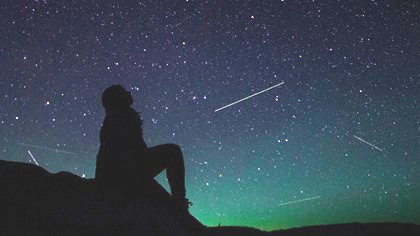
Initial here ____ to agree that the club, advisor, volunteers, De Anza College, the Foothill-De Anza District and/or owners/drivers of vehicles that transport any of your belongings will not be held responsible for them.
For best communication between us while there it is recommended participants stay at Colter Bay (campground
or cabins).
or Colter Bay tent village
At this point, where do you intend to stay? Colter Bay cabins. Colter Bay campground Colter Bay tent village
Other location (describe) :__________________________________
I am certain I will only camp_____.
Do you know who you want to share a room/campsite with? No, I will decide later ____ or Yes: with anyone_______ or yes, list name(s)________________________
Do you have reservations, no / yes. If yes for what _____?
Initial here _____that you will tell the club and your campsite/cabin/carpool mates immediately about any changes in your ability to go on this event and or drive on this event or length of stay.
All overnight accommodations on this trip are the responsibility of each individual trip member, whether they choose a campsite, cabin or hotel.
You agree you will not let anyone not signed up for the trip stay/sleep in your campsite / cabin/hotel room, even if they seem like nice people and are desperate for overnight accommodations. (And, for example at a campsite, in the process of politely saying ‘no’ to someone it could be wise for another trip member sharing the campsite to discretely get the make/model, color and license number of their vehicle.) initial ____
Remember that you are driving a vehicle with out-of-state license plates that make you more visible, so you agree to never play the stereo/radio loud enough that others can hear your music, etc. while you are in the vehicle, driving or not, anywhere in the park. You also agree you will not play music, listen to a boombox/radio etc. that is loud enough to be heard by people in a next-to-you picnic area, campsite/cabin or hotel room, or when any trip member does not want to hear your music. Initial ______
Vehicles with excessively loud exhaust systems disturb nesting birds and other wildlife and are not allowed on De Anza Outdoor Club trips. This can include a muffler that needs repair or an after-market one advertised, for example, to deliver “loud sound both during idle and acceleration . . . a deep and aggressive exhaust note suitable for enthusiasts who love the loud sound . . . powerful, classic muscle car sound.” Initial here ____
Whenever I park at the campsite/cabin I will turn off my car alarm____
I will disable the loud beep that goes off when the keyless remote is used to unlock the car OR I will take the remote off the key chain and use the key to unlock the door(s). ________
I will disable the beep that goes off when the trunk is opened / any other beep ____
In the interests of letting others sleep, if I can’t disable the beep(s) (or disconnect the beepers) THIS SHOULD BE IN THE OWNERS MANUAL or a car dealer can do it for you, I will not drive that vehicle _____
If I rent a vehicle I will learn how to turn off car alarms/disable beeps at the rental business, BEFORE I leave for the trip.______

I will bring everything on the list of required gear at the Snow or rain camp must-haves website page.
I will not wear cotton socks during other than very warm weather.
I will have waterproof hooded rain jacket / pants and a flashlight or headlamp (not just my cell phone to try to use as a flashlight) with me at all times.
I will bring three full liter bottle(s) of water for my personal consumption on any hike
I will plan ahead with people I am sharing a campsite food storage locker with to be sure we limit what we bring and can fit all the food, toiletries, and cooking gear in the locker.________
I will not padlock the food locker unless everyone has a key______
I will follow all hotel/cabin rules, including no smoking in the cabin, no cooking in the cabin or on the cabin grounds (which includes no flame on a campstove, even just to heat water), no campfire on the grounds.____________ The two bedroom, one bath cabins are the same price for 1, 2, 3 or 4 people. If I have extra roommates for any night I will not go beyond the limit the cabin/ hotel has per unit and I will let the cabins office know and pay the extra cost per person. __________
I will not leave snacks sitting out in the cabin, and will bring large securely lidded containers or lidded bins for food storage overnight or when I am not actually next to the food I am eating, because I don’t want the deer mice to nibble on my food. _____________
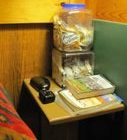
If I stay in a cabin, I will use fused power strips (with circuit breakers built in) for every outlet so I won’t have to wait forever for a maintenance person to come switch the power back on when someone makes the mistake of using two hairdryers and a heater at once.____________
I will follow all National Park, trip and De Anza rules. Since the Rangers can impound my car/food or fine me if I don’t follow food storage rules, I will be responsible for fines, (the college/club will not pay the fine which can be even more than $5,000)_______ I will keep all food and toiletries in the food storage locker except when I am actually using them. _____The park service says food farther than arms length is too far away and behind the back is an invitation (to animals), so I will sit (or have a partner sit) within arms reach of all food I bring out ______ I will shut and latch the door to the food storage box immediately after moving anything in or out _____
I will make sure the vehicle is completely clean of my and others’ trash, food/toiletries at all times____
No daypacks or containers that are shaped like food containers, even empty water bottles, will show through the windows of my vehicle/the vehicle I ride in ____
At bedtime I will triple-check my day pack, jacket and pants pockets for candy bars, chips, flavored chapstick or anything else that could attract animals into my tent, tent cabin or car.____
When I pack I will not mix food in with other gear _____
Since styrofoam ice chests and drinking cups can break up in to bazillions of pieces that can’t be cleaned up, I will not bring anything styrofoam _____
I will not use alcohol or mind altering substances within ten hours of any club activity. I understand this is an enforceable rule even for people over 21. _____
I further understand that use of alcohol in the cold is especially dangerous. I realize that medical/recreational Marijuana is illegal in a national park, even if it is legal in the state the park is located in._____
I will not bring any firearm, knife, explosive, air gun, bow and arrows, spear, slingshot,
or other object (throwing knife, throwing star, taser) that could be classified as a weapon even though some of them may be legal in the park____
I will not transport any explosive (including any size of firecrackers, fireworks or sparklers) during any part of the trip._____
Drones and fireworks are prohibited at all times in the park. If I see a park service rules violation, such as someone using a drone, I will not approach the person(s), but will instead contact the park service and try to give them a description of the people, what they are doing and where, as well as vehicle license plate number, color, make and model.______
I will wear a strapped helmet for climbing, biking or rollerblading even if I am over 17. I will not climb solo or climb without a rope, including minor bouldering. I will not do any bungee jumping, slacklining, hang gliding, base jumping or parasailing. Initial ____
– – – – – – – – – – – – – – – – – – – – – – – – – – – – – – – – – – – – – – – – – –
The Centers for Disease Control and Prevention (CDC) says:
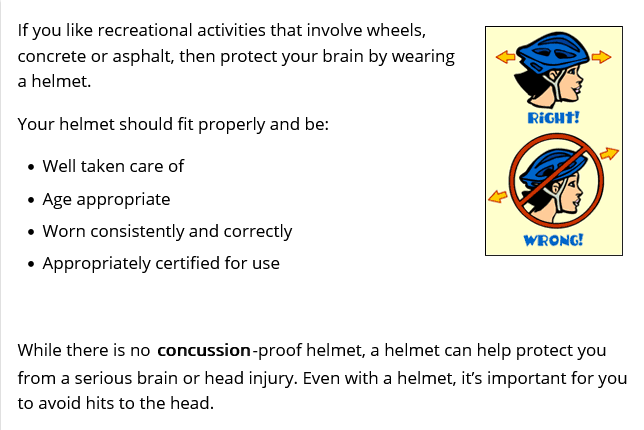
Wearing your bike helmet over a cap or hat is not advised,
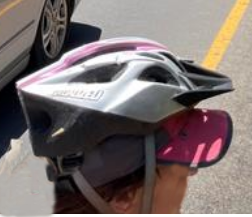
and trying to fit your helmet on over the hood of your hoodie won’t work either,
the helmet needs to be firmly on your head to protect you.
– – – – – – – – – – – – – – – – – – – – – – – – – – – – – – – – – – – – – – – – – –
I will not engage in practical jokes or other (perhaps) well-intentioned conduct that could be misinterpreted or escalate into negative conduct. ______
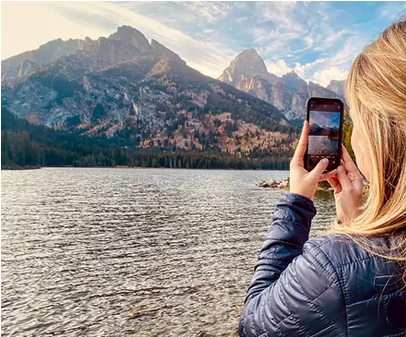
USE OF MY LIKENESS: I understand that during the trip the club advisor may photograph or videotape me. To the fullest extent allowed by law, I waive all rights of publicity or privacy or pre-approval that I have for any such likeness of me or use of my name in connection with such likeness, and I grant to De Anza College, the Outdoor Club and the faculty advisor and assigns permission to copyright, use, and publish (including by electronic means) such likeness of me, whether in whole or part, in any form, without restrictions, and for any purpose. _______
If I do not want to be in a group photo I will stand apart from the group while it is being taken._____
It is important you understand that there are risks.
Some adventure programs say that they can guarantee your safety.
The Outdoor Club does not.
The risk of injury, even serious injury or death, is unavoidable in the outdoor environment in which we travel.
Indeed, much of the value of an Outdoor Club adventure lies
in learning how to identify hazards and adapt behavior,
not only on the trip, but also for a lifetime of enjoying the outdoors. Initial______
The regular campground and the cabins, visitor centers, restaurants, stores where you will spend much of your time, have roads for access for ambulances. If you do a wilderness overnight you will be traveling in a remote area with no nearby roads, hours from definitive medical care. Cell phones don’t always work and quick evacuation of a trip member might not be possible. The injured person with a minor injury may need to evacuate themself (with a partner they consult with and choose well in advance) and get themselves to the hospital in town or medical clinic at Jackson Lake Lodge. If the injury is so severe that you and a partner or your group can’t do the evacuation, Search and Rescue can take a lot of time to get to the injured person and get them to a doctor (and you can not always expect a rescue). (Note that this can also apply to when we are doing an all day paddle and the club advisor needs to stay with the main group and will not be evacuating an individual trip member.) Initial______
If one person needs evacuation the whole trip might need to end for everyone else and the rest of the group can actually be put in danger in the process. For your safety, it is extremely important that you share any and all medical or psychological issues you have when filling out the following medical history section of this application.
When was your last tetanus booster? (never) (don’t know) or________ (a tetanus booster within five years of the trip is recommended.)
What medications (including herbal, over-the-counter and prescription for episodic or emergency use) are you taking? Circle none or describe:
Have you ever dislocated a limb/joint? yes / no
It can easily re-dislocate again. Did your doctor tell you how to relocate it yourself? YES / NO Did your doctor say that you should relocate it quickly and not even have to make a trip to the doctor, or will you have to be evacuated? circle one: relocate / evacuate
Do you have a history within the past 3 years of: knee, hip, ankle, shoulder, hand, arm or back injuries (including sprains) YES .NO
Any joint or back surgery? YES .NO If yes to any of the above, when did it occur and what type of injury or surgery?
Do you have full range of motion? Full Strength? .YES .NO (Please include details as to date of last occurrence and the effect of the problem on current activity level.)
Head Injury? YES .NO Loss of consciousness?.YES .NO – Why and for how long?
If yes, the club will need a release from your doctor on official letterhead, as to date of last occurrence and the effect(s) of the problem on current activity level and detailing that you can travel miles and hours from medical care.
What is the most rigorous activity you participated in since the above injury(ies)/surgery(ies). Results?
History of acute mountain sickness, high altitude pulmonary/cerebral edema? .YES .NO
If yes, give details, including when did the illness occur and what were the results?
Neurological problems? YES .NO
Epilepsy? .YES .NO
Seizures? .YES .NO
Stroke? YES. NO.
Dizziness or fainting episodes? .YES .NO
Migraines? YES .NO are they debilitating? YES .NO Taking medications? Frequency
If yes to any of the above, the club requires a release from your doctor on official letterhead, as to date of last occurrence and the effect(s) of the problem on current activity level and detailing that you can travel miles and hours from medical care.
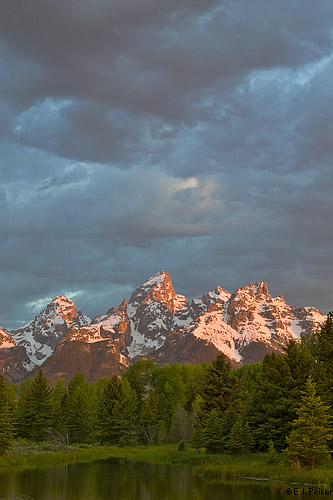
photo above © E J Peiker http://www.ejphoto.com/grand_teton_page.htm used with permission
List everything (food, medications, plants, specific insects…) you are allergic to: circle NONE or list:
Do you have asthma? Yes/ No. Is the asthma well controlled with an inhaler? .YES .NO
If so, you must bring one or more metered dose inhalers (MDI) with you and an aerochamber/spacer is recommended. Please give details of what triggers an asthma attack, last episode, ever hospitalized?
Are your allergies strong enough that you carry an Epi-pen? Yes/ no
If yes to any of these asthma/allergies issues, the club will need a release from your doctor on official letterhead, as to date of last occurrence and the effect(s) of the problem on current activity level and detailing that you can travel miles and hours from medical care and that the supply of inhalers, Epi-pens/Prednizone and antihistamine such as Diphenhydramine you will carry at all times is enough that you will not need immediate professional medical care and that you have been taught how/when to properly use them and will bring printed instructions with them. _____
Treatment or medication for menstrual cramps? .YES .NO
Diabetes? .YES .NO
Bleeding, DVT (deep vein thrombosis) or blood disorders? .YES .NO
Hepatitis or other liver disease? .YES .NO
Disorders of the urinary or reproductive tract? .YES .NO
History of heat stroke or other heat related illness? .YES .NO
History of frostbite or Raynaud’s Syndrome? .YES .NO
If yes to any of the above, the club requires a release from your doctor on official letterhead, as to date of last occurrence, details including frequency, date of last episode, and severity and the effect(s) of the problem on current activity level and detailing that you can travel miles and hours from medical care.
Hypertension/ high blood pressure? .YES .NO
Cardiac problems? Unexplained chest pain? .YES .NO
Cardiac Risk Factors include (circle any/all)
• High blood pressure
• Diabetes
• Smoking
• Current or prior cardiovascular disease or chronic obstructive pulmonary disease (COPD)
• Family history of heart disease (family member who’s had a heart attack at less than 50 years of age).
A stress EKG within one month of the trip and a written note from your doctor on official letterhead stating that you can can participate in the trip and can travel miles and hours from medical care is required
if you
1. Are over 25 years old and have 2 of the above cardiac risk factors.
2. Are over 40 years old and have 1 cardiac risk factor
3. Had a heart attack or have been diagnosed with chronic obstructive pulmonary disease (COPD)
4. Are any age with known coronary artery disease.
5. Completed a cardiac scan and had a calcium score greater than 10.
If this applies to me (circle any/all that do) I will provide a written note from my doctor on official letterhead stating the date of the stress EKG and the results and the statement from the doctor(s) that I can participate in the trip and can travel miles and hours from medical care. _______
If any trip participant is pregnant, they must provide a note from their doctor, on the doctor’s letterhead, stating that it is completely safe for her and the baby(ies) to participate. I am saying that this does not apply to me _______ OR I am saying that I am _____ months pregnant.
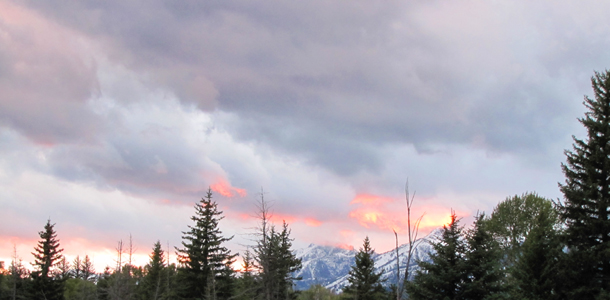
If any trip participant has a serious condition, such as anything that does not allow them to get a driver’s license, a bipolar disorder/anxiety disorder, substance abuse, eating disorders, chemical dependencies, chronic juvenile offenses, a history of violent behavior, suicide attempts, an episode of fear that made them unable to act, or the like, the Outdoor Club needs to know this at least three weeks in advance of any event, so as to seek, where appropriate, a doctor’s assurance that the participant can safely participate and has possession and knowledge of use of necessary medications, and to be sure that the trip members are prepared to deal with special needs, failing which the person may have to be refused participation (subject to Americans With Disabilities Act issues, worked out three weeks in advance with De Anza Disabilities Support Programs and Services (DSPS) counselors ). I am saying that this does not apply to me _______ OR I am saying that I have _______________ condition and have contacted De Anza Disabilities Support Programs.
Have you ever been suspended/dismissed from a school/college for any length of time, ranging from part of one class session to an entire quarter/semester or permanently? Yes/ NO If yes, why?
Have you ever been disruptive in a class or broken class rules in the syllabus? Yes/ NO If yes, what did you do?
Either glasses or contact lenses are acceptable. Sterile lens care is difficult on the trail/while camping, and because of this, their use is not encouraged. Whether you wear contacts or glasses, you must bring an extra pair. Daily disposable contacts can be a good option and avoids dirt and dust build up that can cause damage to your eye. You risk a serious eye infection if you swim wearing contacts, even wearing goggles. Initial ______
If you share clothing/towels/sleeping bag/sleeping pad or other personal items, use sunscreen, any other toiletry or over-the-counter medications, or eat/drink anything given to you by anyone on the trip, you take full responsibility and hold harmless the person(s) who gave them to you, if the sunscreen/over-the-counter medications are not effective or if you develop an allergic reaction/rash, food poisoning or any other malady. Initial: ________
I will pack two sets of any required medications, preferred over-the-counter meds in separate dry bags while paddling.______
Initial that you will not share prescription medications ______
I will not use perfume/cologne – people sitting near to me at a meal may have allergies and scents attract mosquitoes and other insects. ________
If I use sprays such as sunscreen or insect repellent, I will not use them where others need to breathe the spray_____
I will not attend the trip if I have vomiting, diarrhea and/or a fever, with or without coughing and shortness of breath____
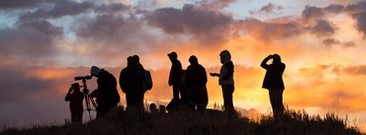
Grand Teton National park has an announcement that some park visitors seem to not have learned about:
“Be thoughtful of how music may affect others. Operating an audio device, such as a stereo, Bluetooth speaker, radio, or musical instrument in a manner which is unreasonable and impacts park users is prohibited by law.” I will not operate an audio device where anyone else can hear it ______
Do you smoke? Y / N We recommend you quit before the trip. Club campsites/ activity areas, (and anywhere that smoke might drift into a campsite/activity area, including during our kayaking and hikes) are non–smoking, including e-cigarettes. All park restrooms or other buildings are non smoking, and smoking is not allowed while moving along a trail in parks or in flammable areas. Even though there is smoking allowed in some Wyoming restaurants, all park restaurants, etc. are non-smoking. All overnight accommodations on this trip are the responsibility of each individual trip member, whether they choose a campsite, cabin or hotel, but you agree you will not smoke in or anywhere near (within 100 yards of, a distance as long as a football field) any campsite/cabin/hotel or picnic area. Initial that you will follow all no smoking rules and no one will smell your smoke______
If you do not quit, please acknowledge: Cigarette butts are not biodegradable. Smokers choose filtered cigarettes to be able to breathe in less tar, formaldehyde and hydrogen cyanide. When the filters are left to decay they can release toxic chemicals including the pesticide nicotine, benzene, lead, arsenic and cadmium into soil and waterways. One butt has enough poisons to kill half the minnows in a liter of water, a standard laboratory test for toxins in 96 hours. It only takes two butts to make a small animal seriously ill or even kill them. Initial ______
TRIP ACTIVITIES: This trip will only be an official club event while we are kayaking/canoeing, meals taken together on club funds. People often sightsee together, go on hikes or bike riding together or eat together, either intentionally or by coincidence, with or without the club advisor, and sometimes have gone horseback riding, climbing, whitewater rafting, to the rodeo or to a concert, but the college is not in any way responsible for extra activities. Initial_____
If someone joined any official or not-official trip activity who had not agreed in advance to all the National Park Service, De Anza College and Outdoor Club safety protocols, everyone on the trip could be put in danger. I will not invite or bring anyone not signed up for the trip to participate in any activity during the trip, including official club events or other not-a-club-event extra activities. Initial _____
On the day that people hike into Cascade Canyon they can do so on a park ranger led hike. Any hiking group that goes farther than the ranger-led hike will likely split into faster and slower hikers, and the club advisor can’t be with everyone for the entire hike, therefore the hike will not be an official college activity and parents/guardians of under 18 year old students are expected to be on the hike and fully supervise their under 18 year old children. Initial here to agree _________
Since bike riding is not an official part of the trip, if you ride, you are on your own, but the college wants you to be safe while biking and the club requires that you wear a strapped helmet firmly on your head when you bike. You should ride only between dawn and dusk and stay off the main highway where vehicles are moving at a fast rate and watching scenery, not bike riders. You must ride single file, in at least pairs, but better in threes, talking loudly a lot as you go so you don’t come up fast on a grizzly bear or other very large animal, surprise that animal and get attacked. The safest riding can be done on official bike paths. You must come to a full stop at all stop signs. Initial ____
As you sightsee, park in parking lots in designated parking spaces or well out of traffic on a side road pavement strip. Even while in a car you need to be 100 yards from bears/wolves and can’t just pull over next to one. Initial here to acknowledge this: ______
I will bring a telephoto that is big enough for the photos I want and not endanger myself or others by trying to get close to animals for pictures.__
I will not photograph or videotape (includes using a GoPro) anyone on the trip without their permission ___
HIKING On any hike I will obey trail-closure or warning signage, closed gates, barrier fences and/or advice from Rangers that I not use any trail________
No one should hike alone or with ear buds. No trail running is allowed because you can come too fast up on a bear. Depending on the size of our group we will require that people hike in threes as recommended by the park, so if someone gets hurt it will be more easily dealt with and less likely to spoil everyone’s trip or preferably, if we have a large group, hike in fours, so if someone gets hurt someone can stay with them while two others go for help. Hiking groups of 4s, also make encounters with bears much less likely. You will do this even for non-club sponsored hikes / walks. You acknowledge that the club advisor might hike the same trail but could be miles away from you and is not responsible in any way for your welfare. Initial here to agree to this____
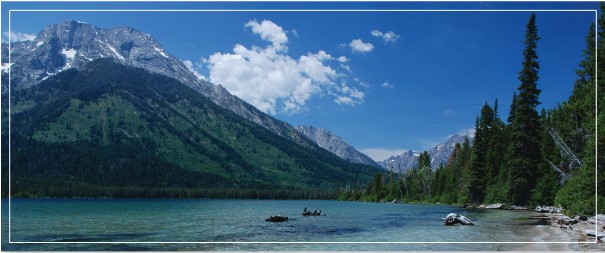
For any hike, everyone must carry bear spray, rain jacket and pants, warm non-cotton clothes even if it is a hot day, a personal first aid kit, more than enough lunch/water, stay on maintained trails and return well before dark, (but carry a flashlight / headlamp in case).
Hiking groups often start out together, or in groups based on perceived hiking ability that day and part way through the hike people who feel most energetic take off faster and farther than others.
Because the trailhead parking lots fill early, even fast hikers must agree to get an early start. No one will engage in an activity the day before that could keep them up so late they do not get adequate sleep and can’t get up early.
On previous trips people in the same carpool and/or hiking group who become too tired have tried waiting at a scenic spot for those who go on, BUT in the past the people waiting have become tired of doing so and decided to go back on their own, leaving the hikers looking for them on the way back confused and worried as to their location/condition, so we do not recommend this.
One exception could be near the end of a hike to the top of whatever peak/end of whatever trail, especially if you choose a spot in an open area where overachievers in your hiking group will be able to see you as they finish the hike and find you easily on the way down, (especially if they stop a few times and look back towards you as they hike farther). No one should go ahead alone or wait alone. Be certain you decide how long the hikers who want to go farther will take and how you will find each other on the return. Do not depend entirely on cell phone or radio communication on the trail. Initial here to agree to this ___
The best practice is for hikers of the same ability to also carpool together to the trailhead (hike start). If carpools split up be certain you communicate details as where/when person (s) waiting for a ride at the end of a hike can expect to be found by the driver. Drivers should never assume a passenger will get a ride with another carpool (but a previous club president did this on a trip and left a passenger behind that there was no room for in the other vehicles.) Initial here to agree to this ___
Horses and pack stock have the right-of-way. On most trails, step to the downhill side of the trail when encountering horses or pack stock and remain quiet. Follow the directions of the wrangler. Remain completely quiet and stand perfectly still. Do not return to the trail until the last mule/horse is 50 feet (15 meters) past your position. Initial to agree to the above_____

I have:
a) never picked up anyone else’s trash I found along the trail
b) sometimes picked up trash
c) sometimes picked up trash, but I don’t do cigarette butts
d) cleaned up everything I found along a stretch of trail so I could earn my Junior Ranger Badge
e) cleaned up everything I found along a stretch of trail just to see other people’s strange looks
f) never cleaned up anything backpacking because it’s too hard to bend over and pick up stuff with a heavy pack on
g) have cleaned foil and cans from fire rings
h) cleaned up used paper on the ground in a “toilet” area
i) haven’t really made an effort before, but I’ll say I will in the future if it helps me pass this test
j) other (describe)
KAYAKING Plans include one or more pre-sunrise launches at Oxbow Bend on the Snake River. Other launching possibilities are listed at the website.
When we are out on Oxbow Bend (and some other locations), we may not paddle much at all, and just sit quietly and watch birds/mammals and the sunrise painting the mountains with color. Persons who do not sit quietly when asked to or other wise disrupt the wildlife viewing will be banned from further kayaking. Initial here to acknowledge this: ______
To catch the sunrise and see more animals we try to get up early (perhaps 4 or 4:30 a.m.). If you are not up and at Oxbow Bend at as early as the advisor gets there you will not launch late without the group. If we have unloaded the kayaks for the people who are there we will not stop and wait to unload one for you when you arrive late, so trying to sleep in a little extra is not advised. If you do not have non-cotton longjohns, hooded rain jacket and rain pants (even if it does not look like it will rain), or won’t properly use a lifejacket, you will not go kayaking. You must agree to stay with the group. Each kayak must be in quiet talking distance, not just line of sight, of another kayak. Sometimes you have to paddle hard to keep the wind from pushing you where you don’t want to go, or to stay with the group. Everyone is expected to keep up with the group, so you will have to paddle when you are tired or your muscles are sore. Stronger paddlers might be paddling fast and then stopping and you might need to paddle all the time. Initial here to agree to this__________
When we’re packed up in the morning and about ready to start kayaking, if the faculty advisor says “Did everybody drink at least a liter of water so far this morning?” you would be likely to:
a) roll your eyes heavenward and sigh quietly
b) throw your hands up in the air, groan audibly
c) plan on always being somewhere else when it seems like Mary will start this
d) say “Why, yes I have, because being dehydrated is a usually overlooked cause of problems for kayakers and I already flossed my teeth today in case I’m too tired in the evening”
e) none of the above (describe)
People who have had difficulties previously kayaking with the club will not be allowed to kayak on this trip. We will have a brief kayak excursion and lesson early during the trip and everyone must show minimum skill to be able to do longer kayaking. Initial _____
I will not try to trade places in a tandem kayak / canoe without first telling the group what I/we want to do, then going to shore where the kayak can be stopped on solid ground to make the switch. I will never stand up in the kayak / a canoe while any part of the boat is out on the water. _________
For kayaking I will wear closed-toed shoes that cover the entire foot, with enough tread left on the bottoms and enough ankle support that I can help carry the kayak. No flip flops! ______ I agree that if I wear improper shoes or do not have waterproof rain gear with me I will not be kayaking and will not get a refund._____
I agree to stay 100 yards from bears/wolves (100 yards is the length of five large buses) and 25 yards from other large animals (25 yards is four car lengths or six kayak lengths or the width of the college pool) _____
(Safe distances from wildlife.)
I will not run from animals, even one that charges me. Initial _________
It is their home, we are only visitors.
Rangers would like you to note: “Be a responsible wildlife observer. Always maintain a safe distance of at least 300 feet (one football field length) from bears/wolves. Never position yourself between an adult and its offspring. Do not feed wildlife, including ground squirrels and birds. Do not harass wildlife. Harassment is any human action that causes unusual behavior, or a change of behavior, in an animal. Repeated encounters with people can have a negative, long term impact on wildlife, including increased levels of stress and the avoidance of essential feeding areas.” … “If your actions cause an animal to flee, (or stop feeding, resting), you have deprived other visitors of a viewing opportunity. Use an animal’s behavior as a guide to your actions and limit the time you spend… respect an animal’s need for space by keeping a safe distance.” This is why it is immoral and illegal to howl like a wolf/coyote or bugle like an elk. If a moose grunts, and you grunt back, it isn’t illegal, but it is dangerous because s/he may chase you. Moose, elk and bison, are big animals that may seem docile, but they are fast and have more of a temper during the fall rutting season and summer baby raising season. Unusual behaviors to watch out for, showing that you or someone else is too close to an animal, include: panting, huffing or making unusual sounds; pawing the ground or swinging its head; neck hair, tail or feathers stand up, animal appears nervous, uneasy or stressed. Initial here that you understand this and will follow such rules ____
BEARS We will be lucky if we even see a bear from a distance. The park recommends for most trails (anyplace away from developed sidewalked areas) that people carry bear spray immediately accessible (personal defense pepper spray is not the same and does not work on bears) so each trip member must have their own. Bear spray is not a repellent and I will not spray it on gear.
Since people must immediately leave an area if bear spray is used on a bear, and that means a campsite and all your gear would have to be at least briefly abandoned, I agree I will not use my bear spray unless there truly is an emergency with actual imminent physical danger from a bear. I know that bears might wander or run through a campsite and that they bluff charge people to get them to abandon their food, but that the spray need not be used in these instances. I will not use the spray at night unless I am really certain there is an immediate need, since if I panic and use it when I should not, I risk using it on a human I mistook for a bear, or on myself in the process, causing severe injury. I will not run from bears, even if one is obviously attacking me. Initial here to agree to this _____
I will remember to not transport the bear spray in the passenger compartment of the vehicle I ride to the trailhead in, or for that matter, at any time on the trip, as it may explode. I will keep the safety clip on the trigger unless I am ready to spray an aggressive bear, so it will not accidentally discharge. Most of the time the use is not needed even if a bear presents itself near us. I will not “test” the spray by spraying it in advance of rarely required use on a bear. Initial here to agree to this ___
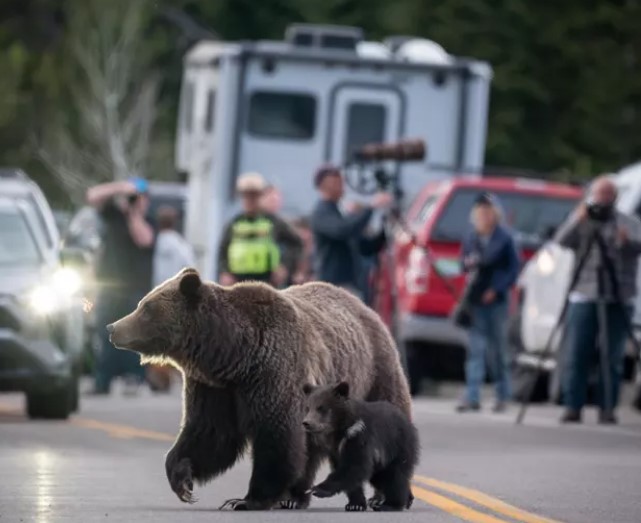
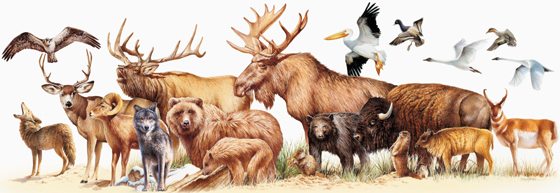
Initial here _________ before the trip I will watch the Yellowstone bear spray use video.
and read: Your safety in grizzly bear territory
Having read this, and watched the bear spray video, if I find myself afraid of having a bear or other animal encounter I will not camp out. Initial here to agree to this ______
And if they are offered, I will attend a Ranger program on safe bear spray use, before I go hiking /biking/kayaking, or even a walk away from developed areas. initial ______
(Before the trip we usually have people put on their fully-loaded-for-a-long-hike large day pack / backpack, and put a can of bear spray either in a outside pocket or on a harness, and decide which kind they will want to carry, see photos at Your safety in grizzly bear territory.)
– – – – – – – – – – – – – – – – – – – – – – – – – – – – – – – – – – – – – –
– – – – – – – – – – – – – – – – – – – – – – – – – – – – – – – – – – –
THUNDERSTORMS We can expect thundershowers, possibly with heavy rain, possibly with hail, every few days in the afternoon. Thunderstorms would cancel all kayaking and swimming. initial ______
During a lightning storm stay in a section of forest of trees the same height, not on a ridge, not under the tallest trees, not in a cave, under a rock overhang or leaning against a tree or standing on tree roots. If caught out in an open area (you saw the clouds forming, and you had plenty of time to get to a safe place what are you doing there?), crouch down. Keep your feet close together. Keep your hands off the ground. Crouch on something insulating if possible, such as your ensolite sleeping pad. Put your fingers in your ears and close your eyes.
Get metal objects away from you (they don’t attract lightning but they carry induced currents which, although they are small, can add to ground currents and make the difference between getting zapped a little and getting zapped too much). Stay out of small depressions. Pick a slight rise instead. Pick the driest place. Spread out your group far apart so you aren’t all hit at once. But mostly, pick a place quickly and set down, and stay down. (In camp, get into a hard-topped vehicle, shut the windows and don’t touch anything metal.)
If someone does get hit, or even nearly hit, they may be thrown a distance, so if they need rescue breathing you’ll need to treat them as a spinal injury and use a modified jaw thrust rather than head tilt chin lift. You can reassure anyone who might have lost vision or has some paralysis that it is common with a lightning hit, and is usually temporary. It is worthwhile to do CPR (or more likely rescue breathing) for quite awhile on a lightning victim, because it’s one of the few times CPR alone without a defibrillator can save someone.
Being outside in the mountains exposes us to random lightning hazards, no matter how careful we are. To be the safest you need to be in a substantial, well-protected building and not stand near windows, take a shower or use a sink, use your Ipod or a landline or cell phone.
Any of our kayaking will be cancelled or at least postponed for a day if we have lightning on the morning we leave or if the weather report says it is likely.
Hikes to peaks/up canyons need to start early, so you can get to the top and get back down before the afternoon clouds build up. If you hear thunder or see lightning you must turn around from a hike to a peak.
INITIAL HERE ____ that you understand and will follow the safety rules above and understand that you are not safe in the outdoors during a lightning storm (and can even be in danger inside) and will follow lightning safety considerations here or in park service materials you should also read, either online or when you get to the park.
Initial here _________that you will reread the webpage Thunderstorm and Lightning Safety for more info you need.
ALTITUDE We are staying at 6,800 plus feet elevation and plan to hike as high as 10,000 +/-feet. At first your heart will beat more quickly, you will hyperventilate to meet the demands of altitude. Take it easy the first day or two. Drinking lots of water helps. Taking any kind of sleeping pills, which decrease respiratory rates, can make it worse. (This can include some kinds of allergy medications.) Avoid eating high fat, high protein near bedtime at least the first night, stick with high carbo evening snacks.
Most people on this trip will lose their appetite at least a little, but should try to eat some anyway. Most people’s bodies will start to adapt to less oxygen immediately, but a rare few will not adapt. True acute mountain sickness is rare at this altitude. Acute mountain sickness symptoms start to appear six to 72 hours after arrival at altitude, and include the aforementioned lack of appetite, plus headaches, disturbed sleep. Aspirin, acetaminophen or ibuprofen (taken with food and lots of water) are okay for the headache. Most people who actually become ill will do so in the first few days, then be okay.
High Altitude Pulmonary Edema (H.A.P.E. a life threatening abnormal fluid accumulation in the lungs) is rare but possible at the 6,800 – 8,000 feet elevation we will be doing most of our traveling. Symptoms begin 24 – 96 hours after ascent, and start out the same as mountain sickness, then progress to extreme shortness of breath and weakness, at first when going uphill, then when on level ground. Nail cyanosis may be apparent. They may cough up frothy blood tinged sputum. I will not buy and expect to use the mini-canisters of oxygen sometimes for sale in the area. The only first aid is to go to a lower altitude (and they need medical care at this point). INITIAL HERE ____ that you understand these risks.
Dogs are not allowed on park trails or in boats where we kayak, and therefore are not allowed on club trips, (including comfort dogs) initial here to accept this and confirm you will not bring a dog or any other pet _______
Will you be doing a backpack of your own? I would like to and will decide when I get there . . . OR . . . Please describe it
and tell us how many____ Garcia food canisters you will need to borrow or rent from the park service.

No alcohol or drug use is allowed during or within eight hours before club activities. This is not just a rule written to make the College happy, it is a trip rule. Initial here _____ Since many people on these trips are adults, and most of the time during the trip we are not doing official club activities, some adults may want to drink alcohol. If we find that anyone does not have a sober designated driver, tries to swim or engage in other activities that require sobriety (a hike, some rock climbing), while not sober, or uses illegal drugs (including prescription medication not prescribed to you or sharing your medication) or gets under the influence enough to be any kind of a problem for others on the trip, they will be expelled from the trip and from their overnight accommodations. I agree that when I drive, I will be 100% sober and not using any mind altering drugs, including during the possibly multi-day drive to and from the trip. I will not give any alcoholic beverages or mind altering substances to anyone under 21, including during the days to and from the trip. Initial here to acknowledge this ___________
Traffic accidents are the most common cause of death in national parks, followed by drowning.
One study found that
“visitors distracted by scenery was a contributing factor in 27% of all motor vehicle crashes,
alcohol was a contributing factor in 23% of the crashes,
visitors from Asia and Europe crossing over the centerline to drive on the left side of the road was a factor in 14% of the crashes,
excessive speed was the primary factor in 8% of the crashes,
and visitors driving off-road and hitting stationary objects or rolling over was the primary factor in 11% of crash fatalities.
If you get pulled over, remember you are driving a vehicle with out-of-state plates for much of this road trip. Even if you are sure you did nothing wrong, be calm and extra polite (but not sarcastically so) when stopped by the police/Highway Patrol/park ranger, and do nothing unexpected. initial here ________
(Reasons not to speed in a National Park.)
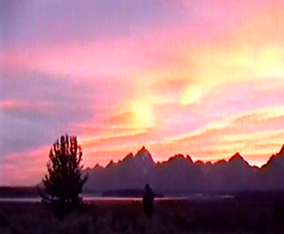
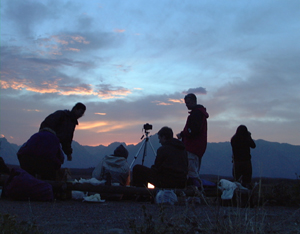
Grand Canyon rangers say: Depending on how prepared you are,
your trip can be a vacation or a challenge, a revelation or an ordeal.
Outward Bound courses address risk this way, and Outdoor Club adventures can be much the same: Living and traveling in a remote wilderness setting exposes you to risks. Yet those risks enable you to gain insights and perspective unavailable anywhere else. Risk and uncertainty are central to the concept of adventure. The intent is not to avoid activities involving risk but to embrace them. Risk is a platform for delivering meaning, growth, physical fitness, and leadership.
I agree to: Stay in talking distance, not just line of sight, of the other kayakers in my group at all times. ____
Since the group can only travel as fast as the slowest paddler, if I am potentially one of the slower people I will take care to pack lightly so my kayak will not be too heavy for me to paddle and when the group stops to let me catch up I will keep paddling so we won’t be still out on the water in the afternoon when lightning can start and the winds pick up, even if I have reeeealllly sore muscles ____
We have had strong people who insist that they can lift a kayak on to the top of a vehicle or the trailer by themselves, but it’s just not safe.
I agree to have at least two or even three or four people under each kayak / canoe as they are lifted up on or down from the trailer._____
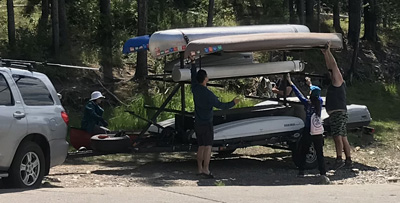
Consider these ways to ruin the trip, either the whole trip or just a wilderness overnight/backpack you might get a permit for,
and plan to either not have them happen
or not be nagged by other trip members who don’t want their trip spoiled:
• Tell everyone your plans for giving/getting a ride, then change the plans at the last minute and/or just don’t let people know right away (this has happened sooooo many times on club trips).
• As you start a hike a few days before a major all day hike (Cascade Canyon, for example), ignore hot spots where skin is obviously rubbing on your boot. Then you can get a blister that can get bigger and bigger and let’s add to the plot . . . happen to get infected just in time for you to require going to the doctor instead of a major hike and your passengers get left out. We need to prevent blisters. You should protect areas you know are prone to blisters. Asking others you are hiking with to stop while you check your feet and apply second skin or moleskin to protect a hot spot does delay the hike for a few minutes but could affect everyone much more later.
• Get a small wound, but don’t clean it carefully because you think it is so tiny. Then it can get infected, just in time for a major all day hike.
• Don’t wash your hands well and regularly, especially before preparing/eating food. Diarrhea is no fun, but especially no fun on the trail away from a restroom.
• Use low sun protection factor sunscreen, very little of it and don’t reapply sunscreen as the day progresses
• Leave food sitting out at the picnic table when you go to the car or just leave any food not within arm’s reach
• Leave the campfire going when you leave the campsite (probably because you did not plan how to take turns going to the restroom)
• Don’t tie back long hair when working around the campfire.
• Ignore that headache and do be sure to get more dehydrated and make it worse. (We recommend drinking more water than you might be used to, at least one extra quart of water the evening before major hikes / all day paddles and one more the morning of major hikes / all day paddles.)
• Try to carry boiling water any distance at all.
• Balance a pan of water/food on a stove that is bigger than 120% of the stove top surface.
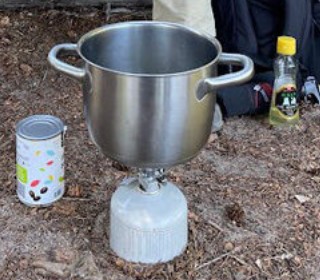
• Don’t bother purifying water, just drink right out of a stream/lake.
• Keep a midnight snack in your tent. Keep a water bottle in your tent that you previously mixed lemonade mix in.
• Try a practical joke. (A guy on a previous winter camping trip thought it would be fun to leave an empty steak package outside a tent of girls to attract animals overnight.)
• Get a bit too rowdy and injure yourself enough on a major hike that you really do need to be evacuated.
• Decide to intentionally break trip/park rules you think are not important. Your passengers can have the potential of being stuck deciding how to get home without you, or your driver can have the potential of you begging them and the other passengers to go home early.
Initial here that you understand all the above and will not do any of them _________
Almost all illnesses/injuries that could require someone to be evacuated or just need to see a doctor can be prevented. This prevention is built into club trips in the clothes you wear. (During a nice warm autumn we could have snowfall.) You agree to not wear any cotton clothing (except perhaps underwear, shorts, bandanna or a t-shirt, but especially not blue jeans/sweatshirt) for any kayaking, overnight backpack or long hikes.)
_________
You agree to bring non-cotton long underwear and fleece overwear_______ You must wear shoes that protect feet/toes, with enough tread, (not Tevas/flip flops) during paddling, portaging (carrying the boats between two lakes if we choose to) and loading/unloading/moving boats at a launch point. Since this footwear will get wet, you will bring a dry alternate pair for after___________
In the interest of preventing burns, and so I don’t have to strain food particles out of water used to boil pasta before disposing of the water, I will plan meals for any wilderness overnight that do not require being cooked in boiling water. I will either have no-cook meals and/or hot meals that only require simmering or pouring boiling water over food ______I will use a stove, not cook/heat water over the campfire and will plan to personally bring enough fuel for whatever stove I use_______ To not attract animals to dig in the firepit I will save the barbecue for the developed campground/picnic areas.___
(Either in the main campground or on any overnight) I will protect wildlife by keeping all food /toiletries/ trash in arm’s reach while eating/using them and when not, in the bear resistant campsite locker. The door to the food locker will remain shut/latched at all times except the few seconds when things are being brought in/out.______
In the interest of leaving less trace of my having traveled I will: Pack out everything I bring in on any over night, including trash and used toilet paper (not burn anything in the campfire). _____ Hike 200 feet from the lake before I dig a toilet hole at least 6-8 inches deep and replace the duff/twigs, etc. so it looks like I was not there._____ If possible urinate on durable surfaces (rocks) instead of plants so that animals won’t dig for salts/minerals found in urine. _____ Before the trip I will lay out a tape measure and count how many steps I take when walking 200 feet so I have an idea how far 200 feet is.____ On a day hike or on an overnight, use the restroom/outhouse at the trailhead even if I don’t think I need to, so I might create one less hole in the ground.______
On any wilderness overnight, if you must wash yourself or your dishes, carry water 200 feet away from streams or lakes and use small amounts of biodegradable soap. Strain food particles from dishwater and pack them out so they don’t attract animals. Scatter dishwater at least 200 feet from the campsite. Do not put any soap in water like lakes, streams (even biodegradable and natural soap pollutes). (EVEN better: I will wait to fully clean most dishes/pans until we get back to civilization ______ ) You really don’t need to wash your hair on a one or two or three night overnight. Think hat/bandanna/braids. _____
In respect for others and to protect the quality of their experience, let nature’s sounds prevail. Allow for others to enjoy the peace and solitude of being in the backcountry. Turn off cell phones unless you must use them, if you do use a cell phone, use it out of sight and sound of other people. No amplified music in the wilderness. Speak softly and avoid making loud noises. Imitating the bugle of the elk or the howl of a coyote you just heard is actually illegal in National parks and quite in the face of neighbors. Animal calls, audio attractants or other means of attracting or disturbing wildlife are prohibited. Initial here to agree to all this_____
Loud and rowdy behavior not only gets in the face of other campers, it can also be dangerous, and having to get a companion with a broken leg or even just a sprained ankle out of the backcountry becomes time and energy consuming for everyone. When people play active games they often forget they are starting to trample a small meadow and can even forget the location of that stove with water boiling on it, trip on it and get a bad burn. Save the flag football, hacky sack games and photos of joyous people jumping in the air for closer to hospitals. Initial here to agree to this_____
For any overnight, if you have them, choose hiking, backpacking, and camping gear and clothing that are natural earth tone colors like green, brown, tan. (Some Leave No Trace web sites also recommend black but it, along with flowery prints and bright colored clothing, attract insects that sting.) Bright colors like white, purple, blue, red and yellow do not blend in with the environment, can be seen from miles away and contribute to a crowded feeling. But do carry at least one item of very visible clothing and/or gear to help rescuers find you if needed. Initial here to agree to this____
Because the parking lot fills early we must be at the start of our all day paddles early. No one will engage in an activity the day before that could keep them up so late they do not get adequate sleep and can’t get up early. ____
Carpools are not arranged by the club or the faculty advisor, but by trip members among themselves. Every vehicle should go to any trailhead with at least a half a tank of gas. Just in case someone becomes sick or injured and can’t stay the night, you should have as many vehicles and drivers as possible to take them to the medical clinic. The injured/ill person who must leave any activity will be responsible for getting a cab or other transportation of their choice back to their usual overnight accommodations after they have been treated. _________
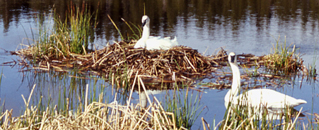

I will use paved pathways or roads to go around in the campground or cabins area whenever possible. I will not go through another group’s campsite to get to the restroom / visit others on our trip. To go to the store/restaurants/showers/laundromat from the campsites, I will either drive or carefully and quietly use the un-official trail that goes along the side of campsite G142. I will have someone show me the start and end of this “trail” before I use it. If I am about after dark I will not shine my flashlight into other campsites. Likewise, there are pathways in the cabins area that I will have someone point out to me, and if I do not want to walk long distances on the cabin roads, I will use these un-official, well-worn “trails” instead of climbing up slopes through the bushes, damaging plants and nests of ground nesting birds and inadvertently shining my flashlight into other cabin windows. Initial here to agree______
I agree to: _Never leave a campfire unattended and put out the campfire completely using quantities of water. _____ Not dig trenches around my tent…even if it is really, really, really rainy. ______ Not use a hammock, since it will damage the tree I tie it to.______
Describe the backpacking, overnight kayaking or camping experience you have, including number of days and distance per trip.
Outdoor Club groups usually help each other out and pitch in on sharing chores. Sometime when things get tough (weather, etc.) people bond even more than when it’s easy going.
But a few people have spoiled club events. One prime example were two girls who decided on the Monterey ocean kayak trip that they were too tired/sore to possibly paddle any longer once we were at least a mile out. They stuck with this despite begging from others to try to paddle and people needed to tow them back. They refused to even paddle while they were being towed. Towing anyone, their gear, and your own kayak/gear on any of our paddles could be impossible.
People who are not ‘tough’ might be inclined to overreact to a minor injury or inconvenience. If you are hurt a little, or reeeeealy tired, Search and Rescue is not going to come out and carry you out of the wilderness, either on a hike or a wilderness overnight you might get a permit for. _________
When someone in the group wants to do something you think is too dangerous, which would be your choice:
A) it’s none of my business to stop them
B) It’s none of my business to stop them unless I think their actions would endanger others
C) I might think something was wrong, but I would have a hard time saying or doing something about it, so I would try to get someone else to agree with me and we could confront the person together
D) I would point out what is wrong, and just restate my case until I wear them down
E) hiding people’s gear so they can’t do whatever it is, is reasonable
F) other (explain)
Initial here _______ to agree
You can be expelled from the trip, and required to leave if we determine that you:
Are unwilling or unmotivated to participate and shoulder your responsibility as a member of a wilderness expedition team, including following all trip and Grand Teton National park rules,
are posing a danger, through misconduct or unsafe practices, to yourself or others, including, but not limited to: approaching animals too closely, not wearing a bike/climbing helmet, food storage violations, unsafe bear spray use or even just joking in any way about bear spray use;
engaging in defiant, harassing behavior, inability to control your temper or otherwise compromising the emotional safety of others;
refusing to continue paddling (because you are tired or . . .) and/or abandoning your boat and hiking out during a club paddle;
using tobacco products anywhere the park says you can’t or that others must smell/breathe the fumes.
Initial here _______ to agree that your kayaking ability/strength and group cooperation ability will be watched by the advisor who can void your continued participation in any/all trip activities. Breaking laws or actions that could endanger yourself or others can get you be expelled from the trip even if these things happen during hours that are not official trip kayaking/hiking/sightseeing times. I realize that if I get be expelled from the trip I will not get a refund and I would have to pay for and move to another campsite/cabin or the Park Rangers could fine me, arrest me or make me pack up and leave the park even in the middle of the night, depending on what I did. If law/rule breaking by only one or more people causes the club advisor to cancel the trip there will be no refunds. The advisor can, for any or no reason dismiss anyone from the trip. You will be fully responsible for any and all costs, including without limitation travel expenses, associated with your dismissal or departure (or the dismissal or departure of a Minor Participant, if any) from the trip for any reason. Initial here to acknowledge this ___________
![]()
You can be expelled from the trip, and required to leave if we determine that you are:
Violating any De Anza College Mutual Respect rules
“De Anza College will not tolerate behavior that infringes on the safety of any student. A student shall not intimidate, harass another student through words or actions. Such behavior includes
• Direct physical contact, such as hitting or shoving
• Verbal assaults, such as teasing or name-calling
• Social isolation or manipulation
• Cyberbullying by any means including email, text and social networks/media”
 Disruptive behavior that can cause a student to be immediately removed from the trip includes: expressions of hatred or contempt based on race, color, national or ethnic origin, age, gender, religion, sexual orientation, marital status, or physical or psychological disability.
Disruptive behavior that can cause a student to be immediately removed from the trip includes: expressions of hatred or contempt based on race, color, national or ethnic origin, age, gender, religion, sexual orientation, marital status, or physical or psychological disability.
If you have visible tattoos with photos, drawings or words that would, in the opinion of the advisor, seem to reflect any of the above, you will be expected to wear a rash guard or similar clothing thick enough to cover up the tattoo(s). A Covid mask or clothing (a t-shirt, for example) with photos, drawings or words that would, in the opinion of your instructor, seem to reflect any of the above, are not allowed on the trip.
Initial here to agree to the above_________
![]()
Waiver: In consideration of being permitted to participate in any way in the field trip hereinafter called the Grand Teton Nat’l Park Kayaking Trip, I, for myself, my heirs, personal representative or assigns, do hereby release, hold harmless, waive, discharge, and covenant not to sue Foothill-De Anza Community College District, its Board of Trustees, the individual members thereof, all District officers, employees, volunteers and servants from liability from any and all claims including the negligence of Foothill-De Anza Community College District, its Board of Trustees, the individual members thereof, all District officers, employees, volunteers and servants, all other sponsors and supporters, resulting in personal injury, accidents, or illnesses (including death) and property loss arising from, but not limited to my participation on the Grand Teton Nat’l Park Kayaking Trip. _______
photos below used with permission from Ron Niebrugge: http://www.wildnatureimages.com/
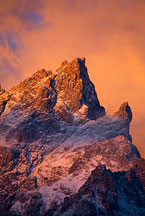
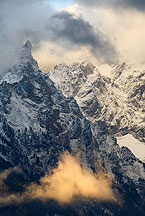
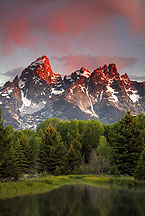
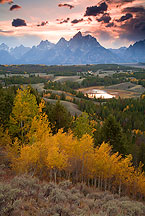
Assumption of Risks: Participation in the Grand Teton Nat’l Park Kayaking Trip carries with it many risks which can not be eliminated or even minimalized, even with trip rules and protocols and trip participation of persons trained in first aid and/or CPR, regardless of care taken to avoid injuries. The specific risks vary from one activity to another, but the risks, which I understand and appreciate, include, without limitation, by way of example:
1) trauma caused by emotional distress, fatigue, hunger, thirst, illness, exceeding my physical or emotional capabilities
2) property damage or loss
3) ) trauma caused by dehydration and/or weather, winds, fires or floods and other forces of nature; including mild to extreme hot or cold temperatures and injuries from earthquake, lightning hit or near hit, avalanche, wind, falling ice or rock, frostbite, immersion foot, being hot, cold, wet or uncomfortable
4) injuries such as scratches, bruises, sprains, sun/wind burn, animal/insect bites, allergic reactions, rashes and other poisonous plant exposure,
5) risk of head or other bodily injury while swimming/boating/playing with a boat/kayak/raft/standup paddleboard or other water toy from normal handling or mishandling of the craft, varying water/weather conditions, natural and manmade obstacles, other vessels and water users, varying depth and currents, and/or being thrown by the forces of water/gravity out of a boat/kayak/raft/standup paddleboard or other water toy onto or into other vessels, trees, rocks or cold water, gear, rigging, cargo or other people, illness from unclean water I recreate in/on,
6) risks related to hiking, walking, biking, and camping including equipment failure, blisters, getting lost or disoriented, illness from unclean water and/or food handling, risks related to carrying/lifting packs/gear, risk of head or other bodily injury from tripping/falling, (including on normal terrain and/or uneven or slippery terrain, including debris, talus, snow, ice, sandy or wet surfaces), risks from normal handling or mishandling/storage of bear spray
7) risks relating to using campfires and camping or recreational gear, including cuts, burns (for example from a campfire or hot food/water), pinched fingers, bruises, smoke inhalation, carbon monoxide poisoning, equipment failure despite reasonable care and use
8) careless or reckless behavior or inappropriate conduct on the part of myself or other trip members despite reasonable, but not full-time, supervision and careless or reckless behavior or inappropriate conduct on the part of third parties
9) major injuries such as eye injury or loss of sight, fractures, dislocations, joint or back injuries, heart attack, heat stroke, hypothermia, stroke, concussions, animal bites, poisonous snakebite, and other wildlife, natural hazards or animal encounters (including diseases such as Hantavirus or rabies)
10) risks due to hospital facilities, qualified medical care and medical evacuation being limited by local conditions, limited possibility of assistance/rescue; and limited ability/inability to communicate with rescue personnel.
11) catastrophic injuries including drowning, loss of limbs, paralysis, permanent trauma and death.
12) risks and dangers that are impossible to know or predict,
13) I understand that any equipment that I provide or that I borrow from any trip participant or from the Outdoor Club or any other provider I use at my own risk and that any such equipment is provided without any warranty as to its condition or stability, including clothing and/or gear that the club advisor/officers/other trip members look at and say is adequate. I could still drown despite wearing a lifejacket the club provides me.
I have read the previous paragraphs and I know, understand, and appreciate these and other risks that are not specifically identified, unknown or unanticipated risks are inherent in the Outdoor Club Grand Teton Nat’l Park Kayaking Trip. I hereby assert that my participation is voluntary and that I knowingly assume all such risks including significant ones, which can not be prevented. Initial ____
Severability: The undersigned further expressly agrees that the foregoing waiver and assumption of risks agreement is intended to be as broad and inclusive as is permitted by the law of the State of California and that if any portion thereof is held invalid, it is agreed that the balance shall, notwithstanding, continue in full legal force and effect. Initial _______
Acknowledgment of Understanding: I have read this waiver of liability, assumption of risk, and indemnity agreement, fully understand its terms, and understand that I am giving up substantial rights, including my right to sue. I acknowledge that I am signing the agreement freely and voluntarily, and intend by my signature to be a complete and unconditional release of all liability to the greatest extent.
I further agree that the venue for any legal proceedings shall be in Santa Clara County California. Initial _______
Initial or sign here _____that you have had any questions about the trip or trip rules answered.
I acknowledge that engaging in this activity may require a degree of skill and knowledge different from other activities. I certify that I am fully capable of participating in this activity. Initial_____
I acknowledge that I can read this contract at the website: marydonahue.org and I will not get a hardcopy of it___
Print Name___________________________________ and initial one of the following statements:
_______ I am 18 years of age or older and I will be the participant.
_______ I am under 18 years of age and I will be the participant.
I have read the above trip agreement and understand its terms. I hereby assert that my participation is voluntary and that I knowingly assume all risks including significant ones that can not be prevented.
Signature of Participant _________________________________________ Date__________ 20XX
—– (If participant is under 18 years old, a parent or legal guardian must also initial and sign, as well as attend the trip),
Name of (circle one) parent / legal guardian ______________________________________________
_______ I am the parent or legal guardian of the participant who is under 18 years of age to whom the 25 pages of statements apply and for whose benefit I am executing this Agreement.
I have read the above trip agreement and understand its terms. I hereby assert that participation is voluntary and that the participant and we knowingly assume all risks including significant ones that can not be prevented.
Signature of Participant’s parent or legal guardian____________________ Date__________ 20XX
phone number of parent or legal guardian if they signed: home _____________________________
cell ____________________

Road trip advice and etiquette has links to radio station guides and gasoline prices across the country, as well as for ways to save your sanity and save friendships on a long expedition, including decisions to make before the trip, packing advice and more from previous road trip members that could make the long drive more tolerable and maybe not sooooo boring.
For a laugh and for pictures of tents to NOT take on our trips scroll down to the bottom of Camping Blunders
There’s easy camping info at: Have more fun camping and camping solutions for women
Download a National Park Service Grand Teton App
Short and long park brochures about activities, natural history, cultural history, bear safety and more.
__________________________________________________

At bears you will find:
links to general info about bears,
then practicalities of camping and backpacking around bears, (Food Storage , what to do if you see a bear, how bears get into cars, info for backpackers) and lots of stories about bears getting into cars, tents, camps, etc., mostly geared towards De Anza College Outdoor Club trips around bears in California (especially Yosemite National Park) and Grand Teton National Park.
And the answer to the question:
Why don’t the rangers just move the problem bears?
and the question:
How can I keep a bear out of my campsite?
(You can’t, but you can almost always keep it out of your food.)
__________________________________________________
A reminder: Trip cost includes part of the cost of the bear spray, which is required for everyone to carry. Each trip member is required to attend a ranger program on safe bear spray use and watch an online video and read about bear spray before they go hiking, biking, kayaking or even walking away from developed areas. The ranger programs are offered every day at at least one Grand Teton National Park visitor center.
In a dozen years of club trips no one has had to use (spray) any bear spray.
and see Your safety in grizzly bear territory
There is free WiFi that anyone can use without a secret code available at the Colter Bay laundromat/showers, (which are a short walk from the campground)
the main Colter Bay restaurant, the Moose Visitor Center and in the Jackson Lake Lodge parlor Jackson Lake Lodge vicinity.
Trip webpages worth looking at again:
A webpage of important things to do in advance of the trip
(some of them should be done well in advance)
Colter Bay campground info and map
Colter Bay cabins info and pictures
Most previous trip members have stayed at either the Colter Bay Cabins or campground but you could check out other potential places to stay: Grand Tetons hotels, cabins, lodging
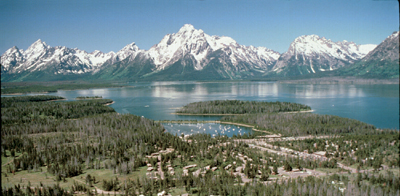
Details about how to get to Grand Teton National Park, (fly all the way, or get a cheap ticket to fly part way and then rent a car and drive the last 6 hours, or get a cheap ticket to fly part way and then take a bus into Jackson, Wyoming or drive by yourself or in a small or huge carpool) as well as driving notes for the Tetons trip to help you SAVE MONEY ON GAS AND TIME ON THE ROAD, are at Grand Tetons trip transportation
Equipment advice just for this trip
(besides the gear you MUST HAVE at Snow or rain camp must-haves ).
Think you can’t afford this trip? Think again, and read Grand Tetons trip cost, it has examples of
The cheap trip,
The not-so cheap trip,
The slightly more costly trip, but less driving time,
also known as the I-can’t-get-much-time-off-work trip,
and The Expensive Trip.
Grand Tetons kayaking has descriptions of various day trips we plan
Grand Tetons restaurants
Grand Tetons sightseeing
Grand Tetons Weather
Grand Tetons recommended reading Check out some books from the library in advance of the trip or download some for free.
Some groups have previously decided to try a backpack of the main trail we hike (Cascade Canyon) after we hiked it. Some backpacking details are at: Grand Tetons backpacking
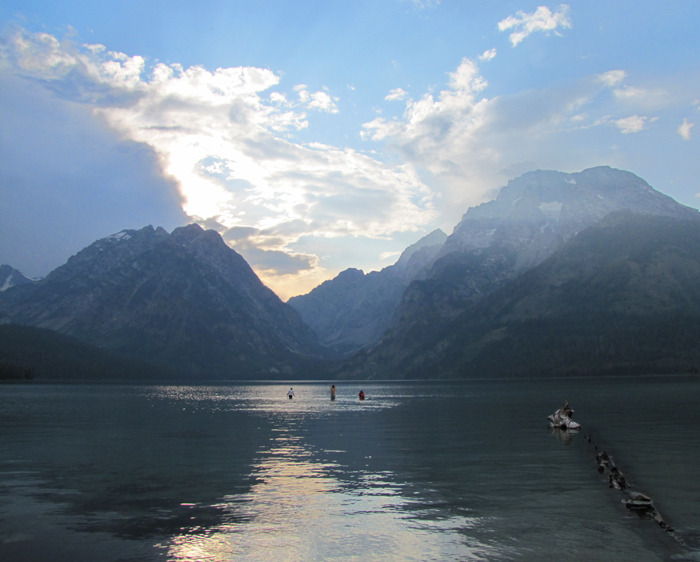
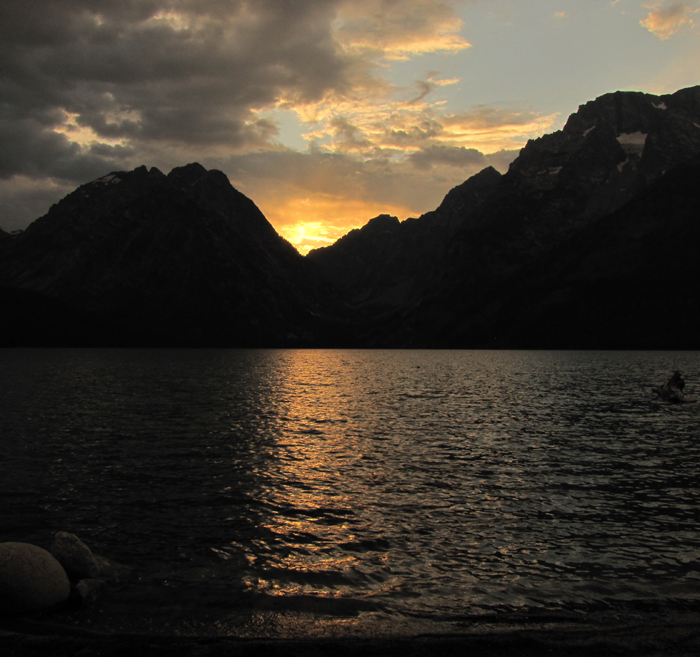
The author of this webpage, (written as a reading assignment for my students), does not give any warranty, expressed or implied, nor assume any legal liability or responsibility for the accuracy, completeness, or usefulness of any information, product, or process included in this website or at websites linked to or from it. Users of information from this website assume all liability arising from such use.
